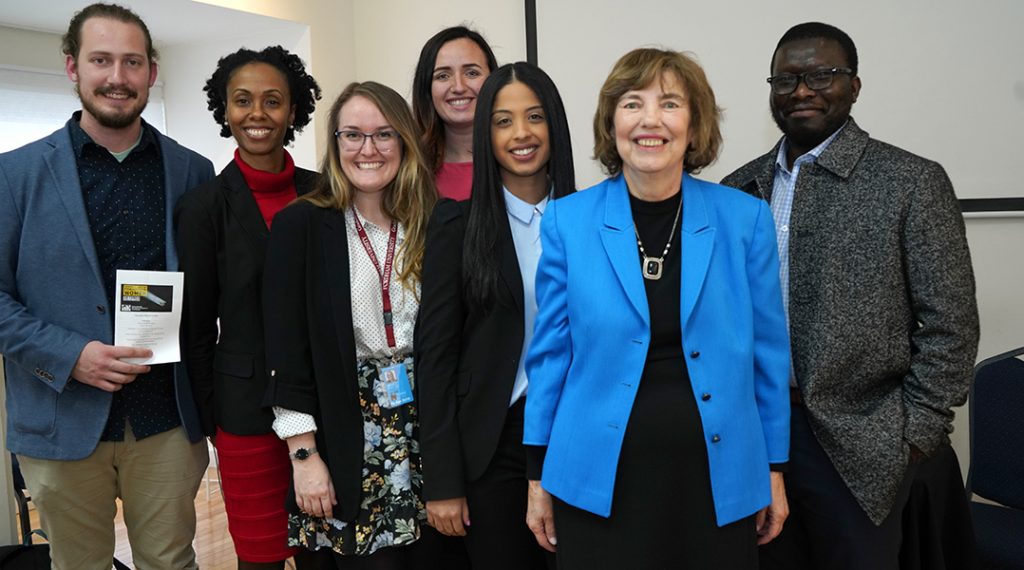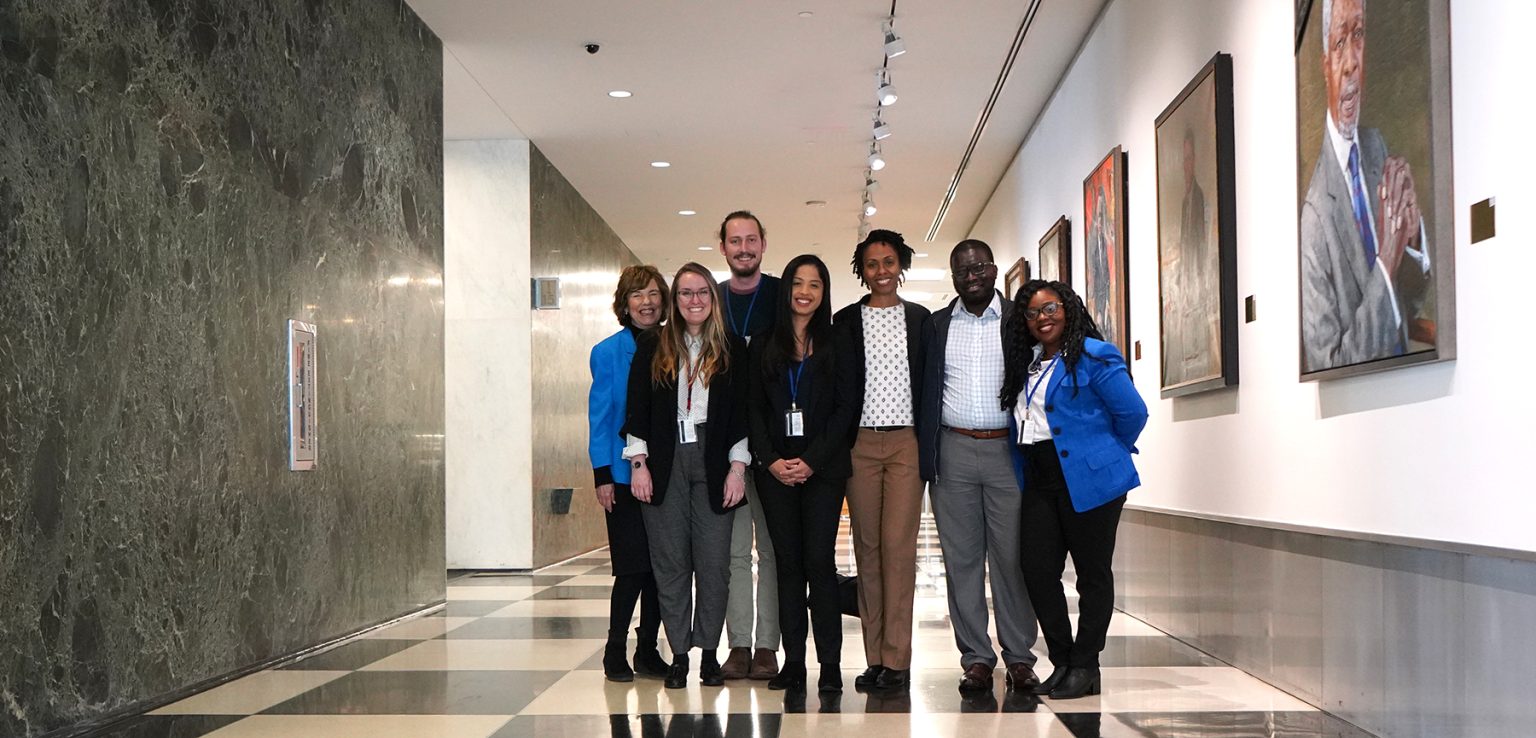The group’s diversity reflected that of the United Nations. Members hailed from Brazil, Ghana, Haiti, the Dominican Republic, and nearby Orange County. Most of them had already entered the working world: Three were on leave from their jobs at the city’s Administration for Children’s Services (ACS), one was taking time away from her position as a case manager at an independent living center for people with disabilities, and a third was currently working with immigrant students at a Washington Heights nonprofit.
As part of their participation in the U.N. student group, they each held internships at nongovernment organizations that are affiliated with the U.N., including the International Federation of Social Workers; the Unitarian Universalists; the Public-Private Alliance Foundation; and Close the Gap, an NGO bringing technology to remote areas of the world.
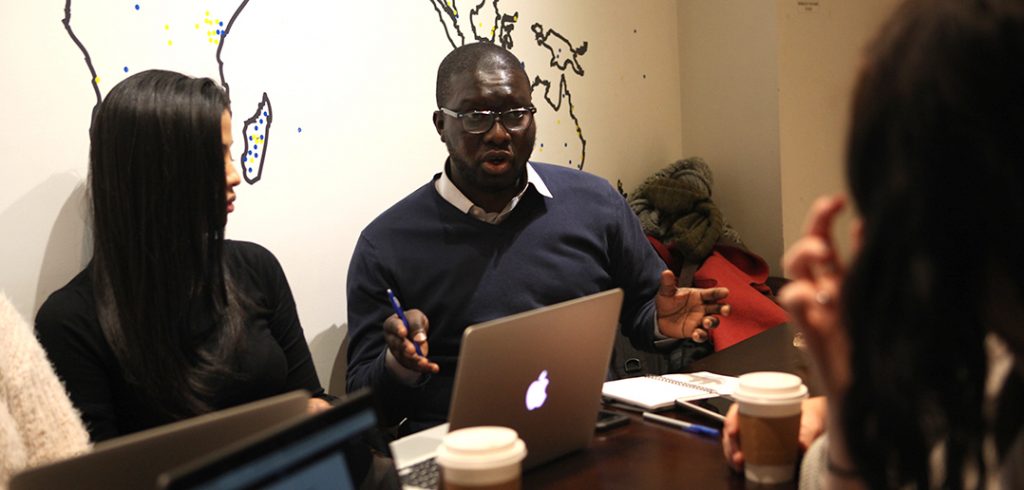
Collaborating Over Coffee
These café meetings provided the group with an informal way to talk about their work, support each other, and even rib each other a little.
“It’s pretty easy-going. There are a few running jokes and some teasing,” student Alessandro Guimaraes said of the early-morning sessions.
“A lot of things come up. When they needed two more people to present at a conference, (classmate) Taylor and I volunteered. When it comes to work there’s always more than enough people to speak about the issues we each work on. If we can’t speak then on something, we’ll help do the research.”
In the weeks that followed, the students sat in on several U.N. committees and related events, including a presentation of the rights of indigenous peoples, a meeting of the Committee on Migration, and the Women’s Institute Conference. They presented research to the American Psychological Association, at the Commission on the Status of Women, and organized several conferences and panels of their own. Between their NGO internships and their additional time at the U.N. itself, they far exceeded the 21 weekly hours required to complete their second year’s fieldwork requirement.
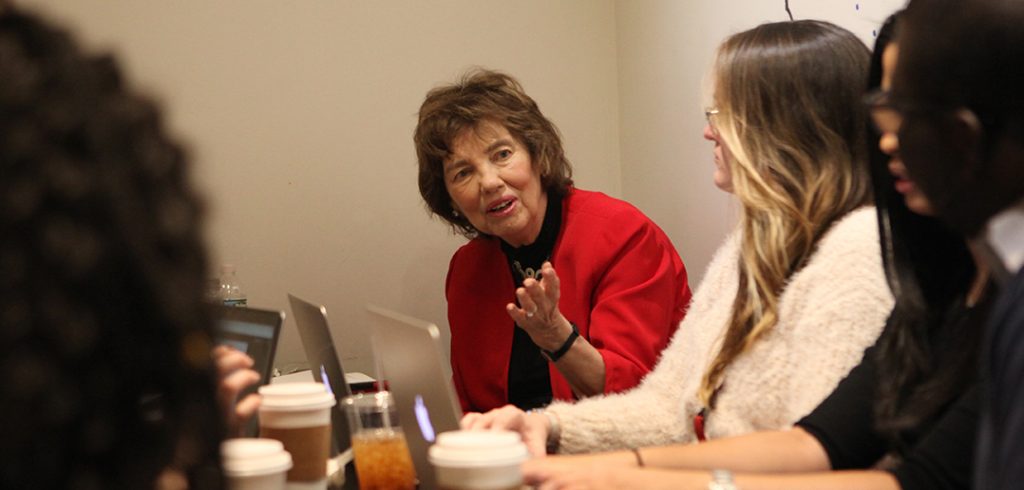
Guidance from a Celebrated Social Work Educator
In the café, beneath a map of the world, Elaine Congress, D.S.W., a longtime associate dean at GSS and a respected stalwart in the field of social work, observed her students as they bonded over program she directs.
Hers is a well-known name in social work circles. Debra McPhee, Ph.D., dean of GSS, once said of Congress:
“There isn’t anybody in the profession who doesn’t know Elaine. The two most common questions we get are ‘Do you have a Ph.D. program?’ and ‘Is Elaine Congress still teaching there?’”
Congress said that the morning meetings help counterbalance the formality of the U.N. Similarly, she said the program came into being rather informally as well.
“The person that had been chair of the international committee for New York City’s National Association of Social Workers and the main representative for the International Federation of Social Workers said to me, ‘Would you like to represent the NGO at the U.N?’” she recalled. “That’s how I started working with these NGOs.”
Almost immediately on her arrival, she began getting her students involved, first in assisting IFSW, and later at other NGOs internships she arranged
Around her, the students swapped stories from their day jobs and outlined plans for future conferences that they were organizing. The initial levity gave way to serious moments when they discussed what they’d heard in their various committee meetings.
For Guimaraes, the statistics can be shocking—“whether we’re talking about violence against women or indigenous people being taken from their lands,” he said. “We’re human and we have emotional reactions, but a lot of times you become used to hearing those things and it’s not as shocking. But that’s why we’re here to do the work.”
As the meeting ended, Congress watched her students fan out to their various committee meetings.
“These are the future social worker leaders in our city, in our country, in our world,” she said.
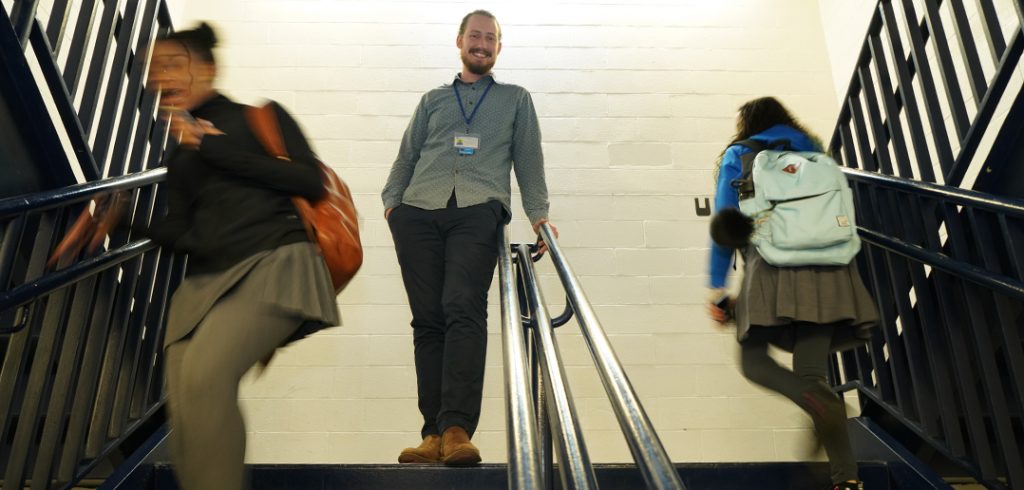
An American Immigrant Helping Immigrants
When Guimaraes walks the halls of Gregorio Luperon High School for Science and Mathematics in Washington Heights, teens give him a hand slap and a half hug. He serves as a counselor at the school, which is the setting of a second concurrent GSS field placement, one that is more people-focused than his U.N. work. Spanish is spoken everywhere in the halls. Guimaraes talks about the kids as they pass him: “He’s on the chess team. … We stared the school newspaper with him. … She’s on our drum team.”
One student stops him and asks, “What’s that test you were talking about? The P-something?”
“The PSAT,” he answers. “Give me a second, I’ll get you the form.”
He explains to a visitor that the high school is for students who have been in the country for less than four years. Most are from the Dominican Republic, where the schools are often at capacity and lacking in quality, he said. After Hurricane Maria hit Puerto Rico, the school saw an uptick of students from there, but most of the students don’t arrive with an American passport. There were a few migrants from El Salvador. Recently, there was a student admitted from Venezuela. She hadn’t eaten for four days before arriving.
Guimaraes can relate to these kids. He left Brazil when he was a teen to live with his father in the U.S. He didn’t speak English and he struggled.
“I had my own experience going through changes—changing country, changing education. I was a pretty bad student in Brazil because I didn’t have anything that I knew I wanted to work toward,” he said. “When my dad asked if I wanted to come I said, ‘What the hell do I have to lose?’”
Guimaraes acknowledged that his challenges were not as difficult as those faced by immigrant students in Northern Manhattan. But his past remains part of the reason he wants to work on problems created by migration. It’s also why he likes his full-time job with Fresh Youth Initiatives, a community-based organization (CBO) that helps immigrant children navigate grade school and high school, as well as prepare for college. The job sprang from his first-year placement. He liked it too much to leave, so this year he began working there full time and takes his GSS classes on the weekends.
“I am just trying to figure out, how can people have opportunities that might spark that interest in them. The more challenges you have to go through, the less likely you’re going to have that opportunity. I’m just trying to be the bridge between those different worlds. That’s what I want to do,” he said.
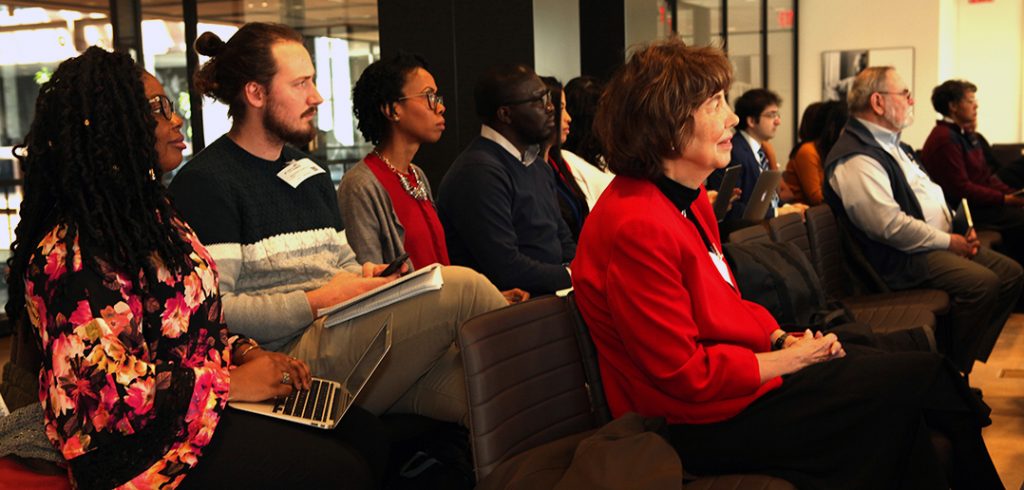
Global Informing Local
Guimaraes said his work at the school is informed by his U.N. placement, which is with the International Federation of Social Workers (IFSW), where he chose to focus on the Committee on Migration and its subcommittee on Migrant and Refugee Children.
The dual placements allow him to see the micro practice at the local level and hear the macro approach of policy at the global level. The two go hand-in-hand, he said.
He’s appreciated getting the global perspective, but he’s noted that bloated bureaucracies can stymie getting things done at the local level.
“We know what we have to do: We have to open up access for people to get quality education, get health care, all that kind of stuff, and preserve their basic human rights of being able to move if they have to.”
But approval processes are complex and implantation of new ideas can prove difficult. And the recent uptick of anti-immigrant rhetoric in the U.S. hasn’t helped, he said.
“The students I see may be a little bit behind, may need a little bit more time and resources before they can contribute to society, pay taxes, all of that,” he said. “But all of it just has to do with that welcoming piece. In the United States, the people with this point of view are not the ones who are in government now and so they’re turning other people away.”
And though he’s appreciated watching international policy develop at the U.N., he thinks he wants to continue to work at the local level.
“I haven’t found myself with enough motivation to leave clinical practice entirely, because while we have to think globally and advocate for global issues, the work has to be done locally,” he said. “If you can connect with communities, engage community-based organizations, the public-school system, politicians, stuff like that, on a community level, you’re able to slowly take it up a level, even as far as the U.N.”
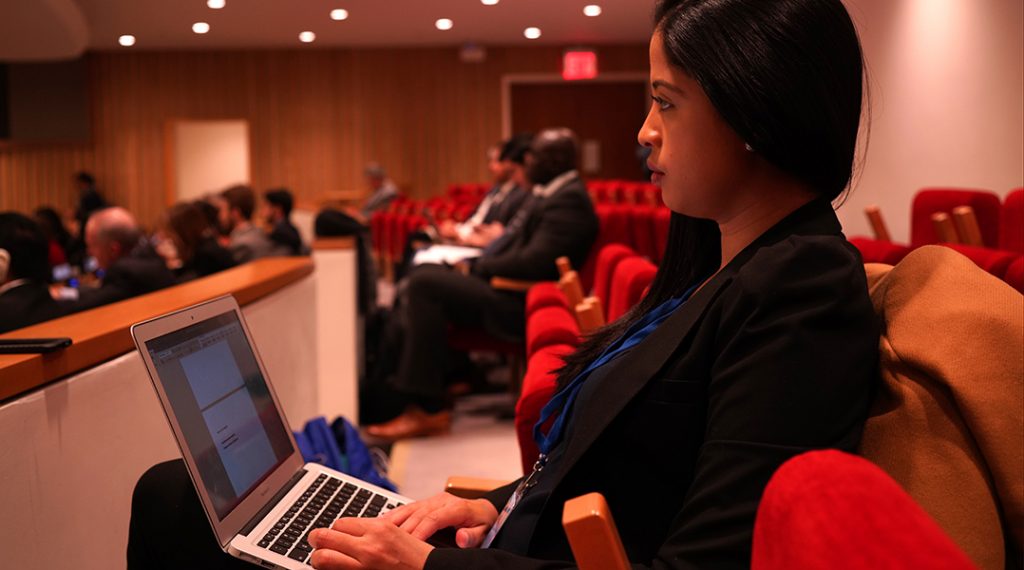
Valentine’s Day
A month passes; the students have continued to meet every week at the café near the U.N., which Congress has come to call her office. It’s Valentine’s Day and one of the students is passing out chocolate hearts. Another is getting teased for his constant attempts to delegate work.
Yasarina Almanzar smiles knowingly. Almanzar also works for ACS; she deals directly with the children and their families when the court finds her supervision necessary. Like her colleagues, she’s been given leave and a partial scholarship to get her master’s at Fordham.
Two days a week she goes to her U.N. internship at the Unitarian Universalist Office of the United Nations. There she focuses on different social justice issues. She’s been working with other interns to organize a three-day seminar focused on equality. As part of her research for the conference, she met the Special Rapporteur on contemporary forms of racism, a human rights expert appointed by the U.N.’s Human Rights Council.
“I’m not really exposed to that kind of work at ACS, things like policy work and how you go about bringing a change,” she said. “It helps my work at ACS, because we have a lot of children of color, it’s important to understand the work that’s being done internationally.”
As an immigrant herself—she arrived from the Dominican Republic when she was 12––Almanzar has experienced racial bias first hand.
“As a woman of color, I see the differences in treatment I get,” she said. “And in terms of my clients, who are people of color that have needs, understanding how to advocate for them becomes a great cause.”
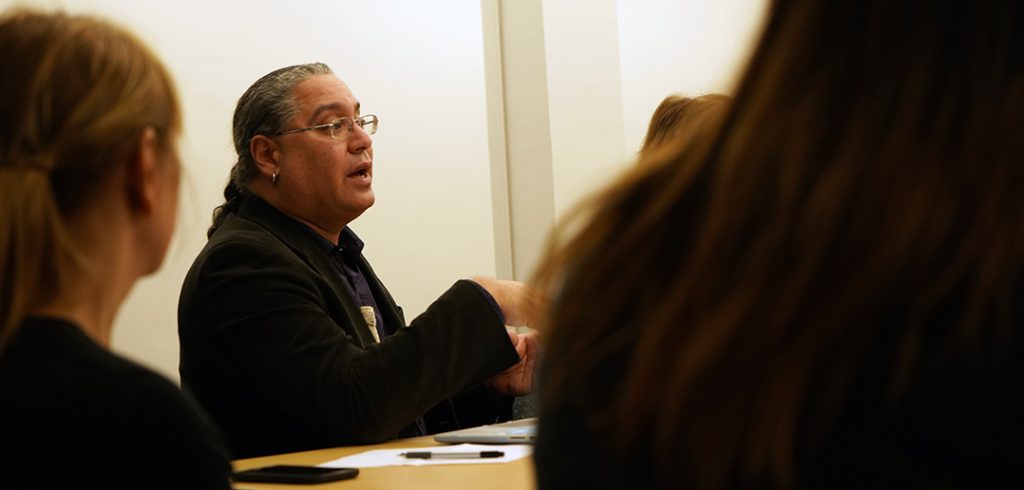
Advocating for Others Who Don’t Look Like You
Almanzar’s lived experience as a woman of color contrasts sharply with Guimaraes’ experience as a white man. She can go into a community as a part of the community. Whether one is advocating on behalf of a community-based organization or an NGO, it helps to look like the people you’re representing, said Guimaraes.
“Coming here from Brazil at the age of 14, without any English, I couldn’t really identify myself with white Americans, even though I was white,” he said. “I’ve always tried to be aware of the historical context of how my family ended up in Brazil, how I ended up here, how people move around the globe.”
He said that most of his family fled World War I from Europe and emigrated to São Paulo. Growing up, he was taught to go after what he wanted. But he realizes it’s not that easy for everyone.
“I try to acknowledge that as a cisgendered white male, you get pushed forward more than other people.”
Another great concern of Guimaraes is for the welfare of native peoples. As part of his U.N. practicum, he has served as assistant secretary to the NGO Committee on the Rights of Indigenous Peoples. There he quietly takes down the minutes for the meetings and streams them live on Facebook.
He has been told by a professor to be aware that research differs greatly from lived experiences, and as a social work professional, he needs to be aware of that.
“Yes, you can be an ally, but it’s important to recognize that someone with experience is the expert,” he said. “To the immigration experience, I can say that I lived through it. I can speak to it. To being indigenous, I can’t.”
He tries to teach his students at the high school to engage in the global conversation so they can represent themselves. He even helped one student become a youth representative to an NGO at the U.N.
“If I can teach them how to speak for themselves, or use maybe the privileges or the platform that I have to get them to be better represented, then I think that’s a good thing,” he said.
Roberto Borrero, chair of the NGO Committee on the Rights of Indigenous Peoples, said sitting in on subcommittee meetings opens up a new world view for social work students, regardless of their background.
“There’s different types of learning, there’s learning you get at the University, there’s various tasks that you have to get your accreditation, but it’s different when you participate in meetings where there’s different levels of bureaucracy and you learn to engage,” said Borrero.
On Language
As most of the students have worked for large municipalities, they are familiar with the language of local government and the many acronyms used by its agencies. For example, Guimaraes works for a CBO at the DOE while interning in an NGO at the U.N. Likewise, Almanzar works at ACS serving mostly POC communities. The U.N. and it’s NGOs present yet another set of acronyms and nuanced language use.
“The students are here and witnessing how things work,” said Borrero. “They hear U.N. folks come in, how they talk, the terminology that they use, it might not be the same terminology that they hear in their specific field, but again this has expanded their mind to it.”
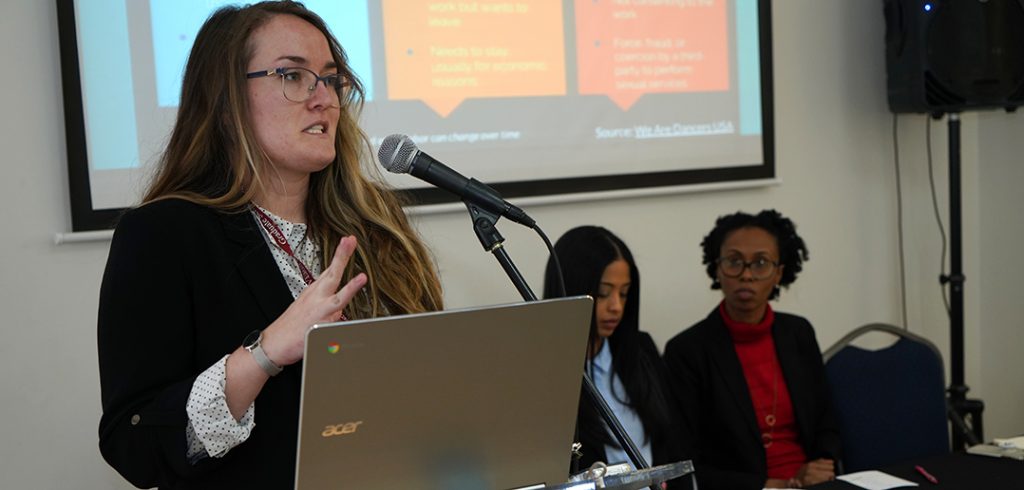
A Careful Introduction
By mid-March the students had attended at least a dozen subcommittee meetings between them. When the Commission on the Status of Women (CSW) convened at the U.N., 400 related panels were held around the city.
The students each presented individually on underrepresented women in a panel titled “Shining a Light on Forgotten Women.”
Indeed, Guimaraes began his presentation on indigenous women with a precise series of caveats, acknowledging his white cisgendered male identity and warning listeners that some of the violence he was about to discuss might trigger people in the audience who had experienced similar trauma. And he shouted out all the women who played a role in his success.
“Thank you to the women in the room, the women in my life, and the women in leadership that helped me speak to you today,” he said.
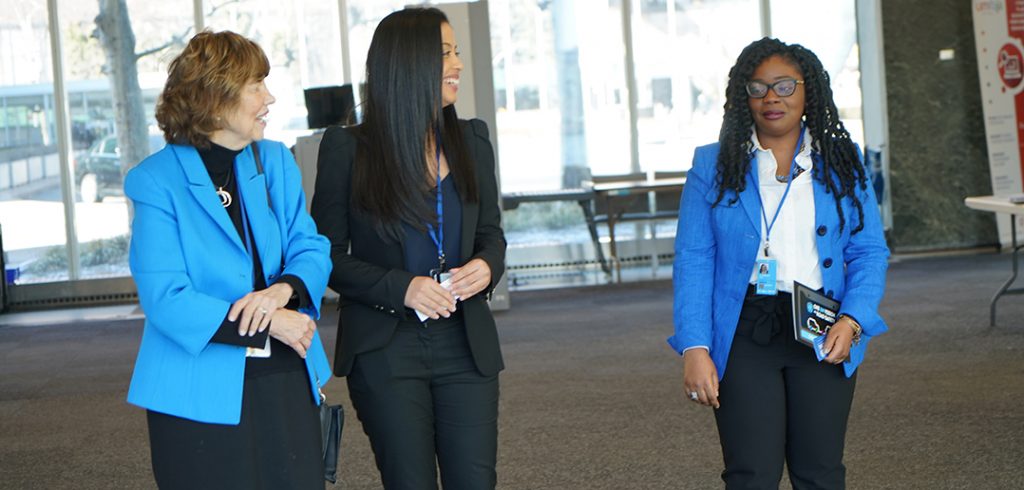
A Rigorous Fieldwork Program
Outside Elaine Congress’ office sits a hopeful student seeking to get into the United Nations program she runs for next year. The student sits quietly, while within earshot Congress explains the program requirements to a visitor in her office.
“We require 21 hours a week for field placements. I take only leadership students, because there aren’t any clients, unless you count nations as clients,” explained Congress.
GSS students have to complete two field practicums: a generalist placement, which exposes students to foundational social work practice, and a specialist placement during the advanced year. In the generalist field practicum, the goal is to expand students’ social work practice experience with populations that are new to them. During the specialist year, students are assigned field placements in their preferred areas of practice, working with more complex client populations and settings. All of Congress’ students are on a leadership track.
With 10 books behind her, Congress is recognized as an expert on many aspects of the discipline, but on multiculturalism in particular. She is working on the fourth edition of widely referenced Multicultural Perspectives in Working with Families (Springer, 2013). And she is the recipient of dozens of awards, including a lifetime achievement award from the New York City chapter of the National Association of Social Workers.
Congress said she has always been interested in social justice work. She worked in a mental health clinic in Brooklyn with the Latino community before getting her doctorate moving toward academia.
“I was always concerned about the poor and I was also very interested in people from different backgrounds,” she said. “Then I came to Fordham, and progressed on up through the ranks from assistant to associate professor to associate dean, and I started to write.”
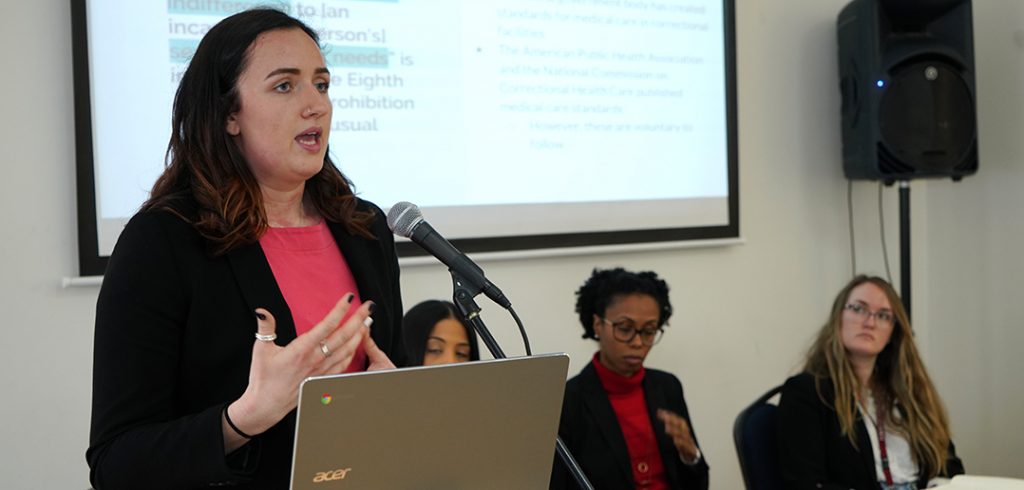
Self-Assessment is Critical
On listening to Congress, one can begin to see the influence she has on her students. As an educated white woman, she said, she too needs to understand where she comes from to help people with backgrounds distinct from her own.
“It’s very important to do a self-assessment even before you begin to work with clients,” she said. “You have to know about who you are before you work with others.”
And, she said, collaboration amongst social workers is key. That’s why she insists on those morning meetings.
“Issues come up all the time. It could be a current event issue. It could be an event at the UN. We talk about all of it. It’s education. It’s also supportive,” she said.
She bid her visitor goodbye and welcomed the waiting student into her office.
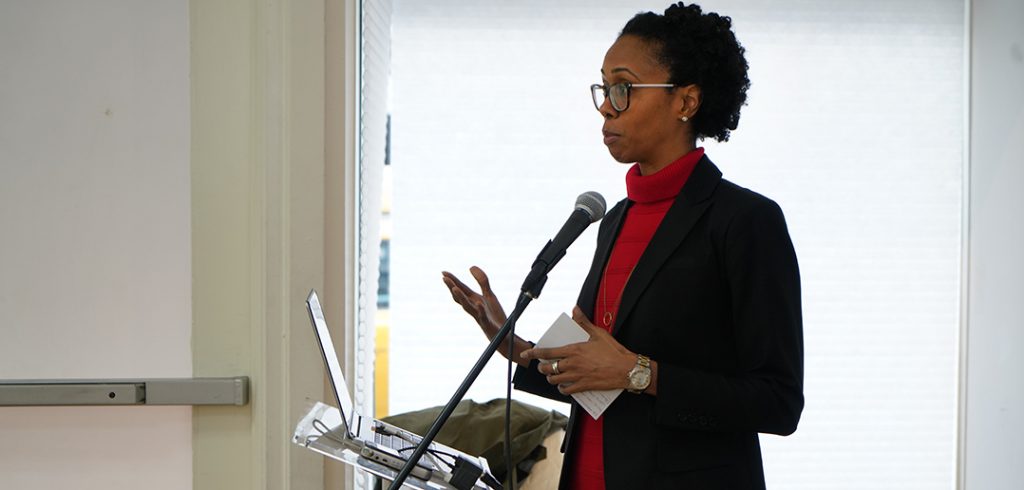
Building Strong Bonds
The bonds formed by these students over the course of the semester are palpable to even the casual observer. They’re fans of each other’s work and offer support at every turn.
When MSW candidate Taylor DeClerck, a case manager at an independent living center for people with disabilities from Orange County, had to present with the group in the city at 8 a.m. on a Saturday, fellow student Abigail Asper put her up for the night.
And the group was uniformly impressed by student Melissa Cueto’s presentation on elderly women at the “Forgotten Women” panel on March 14.
“She is such a great public speaker and she works at ACS too, but I never had an opportunity to meet her until I came here. We all learn from each other and we’re always sharing,” said Almanzar, who reached out to Guimaraes for help in forming a panel on indigenous women.
“One of the best things that come from the group is diversity,” said Guimaraes. “We’re all interested in different topics, but we’re all interested in the advancement of human rights. At some point, they all have to do with each other. They all have some commonalities—like us.”
